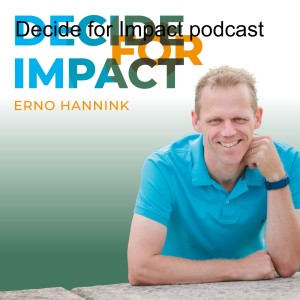
Measuring is knowing with the Life Cycle Analysis - Lefika Otisitswe | Decide for Impact show 397
 2023-06-01
2023-06-01
De notities, links en bronnen vind je hier https://decideforimpact.com/show397-measuring-is-knowing-with-the-life-cycle-analysis-lefika-otisitswe/
In this conversation with Lefika Otisitswe I learned:
- why Lefika came from Botswana to the University of Enschede.
- the quest to find out how much his personal footprint is.
- quantifying the Life Cycle Analysis and then reducing your footprint.
- the vulnerable of the ecosystems in Botswana and understanding sustainability.
- Botswana has 2.3 million inhabitants and is the size of France.
- going back to Africa and using his knowledge and expertise locally and in Africa.
- the importance of cooperation in the topic of sustainability.
- to motivate the countries in developing countries to become more sustainable is difficult.
- how to prevent the same mistakes in developing countries that the Western world made in their development.
- traditional African house, mud hut, regulates the temperature without extra technology and energy.
- Look more into the past and what we can use to develop and adapt. Modernize in a sustainable way.
- Also, learn from biomimicry like the termite houses to use.
- Ho o you know that what are you doing is sustainable.
- The Life cycle approach makes you think about the complete supply chain. This makes us less susceptible to greenwashing.
- Eco-efficiency increased the amount of emission with the Jevons paradox.
- the only way for you to know if something is sustainable is if you measure it (Meten=weten)
- Life cycle analysis is looking at the full picture. Looking at the macro level of the full supply chain of the service.
- They don’t believe in offsetting but only for the unavoidable emissions that we can’t reduce.
- Thriving to be the most scientific-based LCA calculations in the world.
- 80% of the Dutch consumer would opt for a more sustainable solution.
- Within Impulse they do the Life Cycle Analysis and advice companies how to reduce their emissions.
- It is not a name and shame idea, but a let’s do better initiative.
Lefika is the founder and CEO of Impulse international B.V. where they calculate the CO2 emissions of different products and organizations and help reduce the emissions. They believe in a Lifecycle thinking approach where “Meten = Weten” (Measuring = knowing).
More Episodes
De parel in de oester - Erlijn Sie l Show 349
 2022-04-27
2022-04-27
 152
152
 2022-04-27
2022-04-27
 152
152
I AM TAO - Arjan Broere | De Ondernemers Boekencast afl 52
 2022-04-22
2022-04-22
 175
175
 2022-04-22
2022-04-22
 175
175
Samenwerken voor succes - Martin van Diggele l Show 346
 2022-04-07
2022-04-07
 144
144
 2022-04-07
2022-04-07
 144
144
Drawdown - Paul Hawken | De Ondernemers Boekencast afl 49
 2022-03-13
2022-03-13
 214
214
 2022-03-13
2022-03-13
 214
214
No more fast fashion dumps with Wearebasics - Ceren Danis
 2022-03-11
2022-03-11
 154
154
 2022-03-11
2022-03-11
 154
154
012345678910111213141516171819
Create your
podcast in
minutes
- Full-featured podcast site
- Unlimited storage and bandwidth
- Comprehensive podcast stats
- Distribute to Apple Podcasts, Spotify, and more
- Make money with your podcast
It is Free
- Privacy Policy
- Cookie Policy
- Terms of Use
- Consent Preferences
- Copyright © 2015-2024 Podbean.com




